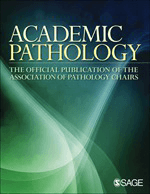
Academic Pathology
Scope & Guideline
Advancing the Frontiers of Pathology and Forensic Medicine
Introduction
Aims and Scopes
- Pathology Education and Training:
A core area of focus is the development and evaluation of educational programs for medical students and pathology residents. This includes competency-based education, curriculum design, and innovative teaching methods. - Clinical and Translational Research:
The journal publishes research that bridges the gap between laboratory findings and clinical applications in pathology, including studies on diagnostic techniques, patient safety, and quality improvement. - Interprofessional Collaboration:
There is an emphasis on collaborative approaches in pathology education, involving partnerships between pathologists, medical educators, and other healthcare professionals to enhance training and patient outcomes. - Diversity, Equity, and Inclusion:
The journal addresses issues related to diversity and equity within pathology education and practice, aiming to promote a more inclusive environment in the field. - Use of Technology in Pathology Education:
A notable focus is placed on the integration of digital tools and technologies, such as virtual microscopy and online learning platforms, to enhance pathology education and accessibility.
Trending and Emerging
- Competency-Based Medical Education (CBME):
An increasing focus on CBME frameworks within pathology residency programs demonstrates a shift towards ensuring that training is directly aligned with the competencies required for clinical practice. - Innovative Use of Technology in Education:
The integration of technologies such as artificial intelligence, digital pathology, and online learning platforms is becoming more prevalent, enhancing educational methodologies and accessibility for students. - Patient Safety and Quality Improvement:
There is a growing emphasis on patient safety initiatives and quality improvement within pathology training, reflecting a broader trend in healthcare to prioritize patient-centered care. - Research on Diversity and Inclusion:
An emerging trend is the exploration of diversity and inclusion within pathology, with research focusing on gender, racial, and socioeconomic disparities in education and career advancement. - Remote and Hybrid Learning Approaches:
The adaptation of remote and hybrid learning formats, particularly accelerated by the COVID-19 pandemic, is an emerging area of interest, as educators seek to maintain engagement and effectiveness in pathology training.
Declining or Waning
- Traditional Lecture-Based Education:
There has been a noticeable decrease in research focused on traditional lecture formats as educational institutions shift towards more interactive and technology-driven approaches to teaching pathology. - Isolated Pathology Research:
Research that does not incorporate clinical relevance or interdisciplinary collaboration appears to be declining, as there is a stronger push for studies that connect pathology findings to broader clinical practices. - Focus on Basic Science Alone:
Papers solely emphasizing basic science without clinical application are less frequent, indicating a move towards research that directly impacts clinical training and patient care within pathology.
Similar Journals

AJSP-Reviews and Reports
Connecting Researchers and Professionals in Forensic ScienceAJSP-Reviews and Reports is a peer-reviewed journal dedicated to the advancement of knowledge within the field of pathology and forensic medicine. Published by the renowned Lippincott Williams & Wilkins, this journal plays a vital role in disseminating insightful reviews and reports that contribute to the understanding and application of diagnostic practices and forensic investigations. While currently listed in the fourth quartile (Q4) within its category according to the 2023 metrics, the journal is committed to enhancing its impact and fostering scholarly dialogue among researchers, professionals, and students in the medical community. Despite challenges in Scopus rankings, it provides a platform for significant discourse and innovation in pathology. Operating from the United Kingdom, AJSP-Reviews and Reports is positioned to bridge gaps in knowledge and inspire future research developments. Readers can access valuable findings without open access barriers, allowing for efficient information sharing within the medical field.
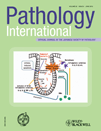
PATHOLOGY INTERNATIONAL
Navigating the Evolving Landscape of Pathological InsightsPATHOLOGY INTERNATIONAL, published by WILEY, stands as a distinguished journal in the field of pathology and forensic medicine, serving as an essential resource for researchers, clinicians, and students alike. With its ISSN 1320-5463 and E-ISSN 1440-1827, PATHOLOGY INTERNATIONAL has established itself since its inception in 1951, navigating through an evolving landscape in medical science with insights and breakthroughs up to 2024. It holds a commendable Q2 ranking in both the Medicine (miscellaneous) and Pathology and Forensic Medicine categories, indicating its robust influence and quality within these fields, as evidenced by its placement in the 70th percentile of Scopus rankings. While currently not an open-access journal, it provides access options that ensure valuable research remains available to the academic community. PATHOLOGY INTERNATIONAL commits to advancing the discipline through pioneering research articles, comprehensive reviews, and expert opinions that push the boundaries of understanding in pathology, thereby supporting the enhancement of diagnostic and therapeutic practices.
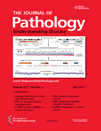
JOURNAL OF PATHOLOGY
Transforming Knowledge into Pathological ExcellenceWelcome to the Journal of Pathology, a premier academic publication specializing in the field of pathology and forensic medicine. Established in 1969 and published by Wiley, this journal has garnered significant recognition within the research community, reflected in its impressive ranking of #6 out of 208 in Scopus, placing it in the 97th percentile. The Journal of Pathology serves as a critical platform for disseminating cutting-edge research findings, innovative methodologies, and topical reviews that advance our understanding of diseases and their underlying mechanisms. With no open access charge, this esteemed journal is committed to maintaining the highest standards of scientific rigor and integrity. As a Q1 journal in its category for 2023, it continues to shape the field of pathology and contribute invaluable insights to researchers, medical professionals, and students alike. We invite you to explore the wealth of knowledge encapsulated in each issue and engage with the vibrant discussions that strive to propel the science of pathology forward.

International Journal of Clinical and Experimental Pathology
Unlocking the Secrets of Pathology for AllInternational Journal of Clinical and Experimental Pathology, published by E-CENTURY PUBLISHING CORP, serves as a vital resource for professionals in the field of pathology. With its ISSN 1936-2625, the journal has positioned itself within the competitive landscape of medical journals, achieving commendable rankings in Scopus, particularly in the categories of Pathology and Forensic Medicine (Rank #98/185) and Histology (Rank #38/58). Although its coverage in Scopus has been discontinued, the journal’s past contributions from 2009 to 2017 continue to be a touchstone for researchers interested in advancing their understanding of clinical and experimental pathology. The open-access format ensures accessibility to a wide audience, fostering collaboration and education in this essential medical discipline. By bridging clinical research and experimental findings, this journal plays a crucial role in disseminating knowledge and enhancing practices within pathology, making it an indispensable tool for researchers, professionals, and students alike.

Malaysian Journal of Pathology
Fostering innovation in medical research and practice.Malaysian Journal of Pathology, published by the MALAYSIAN JOURNAL PATHOLOGY, stands as a pivotal resource in the fields of pathology and medicine, contributing rich insights since its inception in 1979. This peer-reviewed journal, based in Malaysia, is dedicated to disseminating original research, review articles, and case studies that advance the understanding of disease mechanisms and diagnostics. With a current impact factor reflecting its ranked positioning—Q4 in Cell Biology, Q4 in Histology, and Q3 in both Miscellaneous Medicine and Pathology & Forensic Medicine—this journal serves as an essential platform for researchers, clinicians, and students alike. Although it operates without open access, its scholarly rigor and contributions are well recognized, holding ranks such as #84 in Pathology and Forensic Medicine according to Scopus. The Malaysian Journal of Pathology is committed to fostering innovation and excellence in medical research, making it an invaluable tool for professionals seeking to stay abreast of significant advancements in the pathology domain.

Oral & Maxillofacial Pathology Journal
Innovating Pathways in Maxillofacial ResearchOral & Maxillofacial Pathology Journal is a prominent peer-reviewed publication dedicated to advancing the field of oral and maxillofacial pathology. Published by the KAIRALI SOCIETY OF ORAL & MAXILLOFACIAL PATHOLOGISTS, this journal aims to provide a platform for sharing innovative research, clinical practices, and new techniques related to the diagnosis and management of oral diseases. With a commitment to open access, it ensures that valuable knowledge reaches a global audience of researchers, dental professionals, and students alike. Although specific impact metrics such as the HIndex and Scopus ranking are not listed, the journal is regarded as an essential resource for those involved in the oral health community. It plays a crucial role in fostering collaboration and disseminating cutting-edge advancements that can enhance patient care and clinical outcomes in oral pathology. For professionals looking to stay ahead in this dynamic field, Oral & Maxillofacial Pathology Journal serves as an indispensable tool for both foundational learning and advanced research.
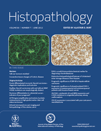
HISTOPATHOLOGY
Fostering Excellence in Histopathological ResearchHISTOPATHOLOGY is a premier scholarly journal published by WILEY, targeting the fields of histology, pathology, and forensic medicine. With an ISSN of 0309-0167 and an E-ISSN of 1365-2559, this esteemed journal has maintained a strong academic presence since its inception in 1977. Boasting an impressive Q1 ranking in crucial categories such as Histology and Pathology, it ranks 13th out of 208 in Pathology and Forensic Medicine, and 5th out of 62 in Histology, reflecting its high impact and relevance within the scientific community. HISTOPATHOLOGY serves as a critical platform for disseminating significant research findings, reviews, and advancements in the diagnostic and therapeutic aspects of pathology. Although it does not operate under an open access model, its rigorous peer-review process ensures that published articles uphold the highest standards of scientific integrity. Scholars and practitioners alike benefit from the insights shared in this journal, as it aims to bridge the gap between laboratory science and clinical practice, fostering innovation and enhancing our understanding of disease mechanisms.

Clinical Pathology
Advancing the Frontiers of Clinical DiagnosticsClinical Pathology, an esteemed journal published by SAGE Publications Ltd, stands at the forefront of advancing knowledge in the intersection of histology, microbiology, and pathology. As an Open Access journal since 2019, it provides researchers and healthcare professionals seamless access to high-quality, peer-reviewed articles that contribute to the field's growing body of knowledge. With a focus on enhancing diagnostic methodologies and advancing clinical applications, Clinical Pathology serves a diverse audience eager to explore innovative research and practical insights. The journal currently holds Q3 status in Histology and Pathology and Forensic Medicine, and Q4 in Medical Microbiology, reflecting its commitment to rigorous scholarship within a competitive landscape. Its ranking in Scopus further positions it as a vital resource for professionals striving for excellence in clinical and experimental pathology. We invite researchers, students, and professionals to engage with the latest findings and share their valuable contributions to help propel the field forward.

PATHOLOGICA
Pioneering Knowledge in Pathology and Forensic Medicine.PATHOLOGICA is a leading academic journal dedicated to the field of pathology and forensic medicine, published by PACINI EDITORE. With a rich history dating back to its inception in 1945, the journal has consistently contributed to the advancement of knowledge in these vital areas of medical research and practice. Currently ranked in the Q1 quartile for Pathology and Forensic Medicine and holding an impressive position as #42 out of 208 in the Scopus rankings, it reflects a significant impact within the academic community, boasting an 80th percentile ranking. The journal is committed to publishing high-quality, peer-reviewed articles that explore innovative research findings and clinical advancements, making it an essential resource for researchers, clinicians, and students alike. Though it does not offer open access, PATHOLOGICA continues to foster scholarly communication by disseminating cutting-edge research findings, thus playing a pivotal role in enhancing pathology education and practice worldwide.
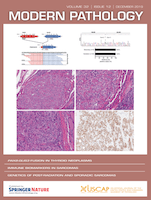
MODERN PATHOLOGY
Exploring the Depths of Forensic MedicineMODERN PATHOLOGY is a premier journal in the field of pathology and forensic medicine, published by Elsevier Science Inc. With an impressive impact factor that places it in the top 1st quartile (Q1) for 2023, and a remarkable rank of 5 out of 208 in its category according to Scopus, it serves as a vital resource for researchers, professionals, and students alike. Established in 1988, the journal focuses on the latest advancements in diagnostic pathology, molecular pathology, and related fields, providing a platform for innovative research that drives the discipline forward. Although it does not operate under an open access model, readers can expect rigorously peer-reviewed publications that contribute to the growing body of knowledge in pathology. With a continuous commitment to excellence and relevance, MODERN PATHOLOGY remains a fundamental avenue for disseminating high-quality scientific research globally, facilitating the growth and development of its field.